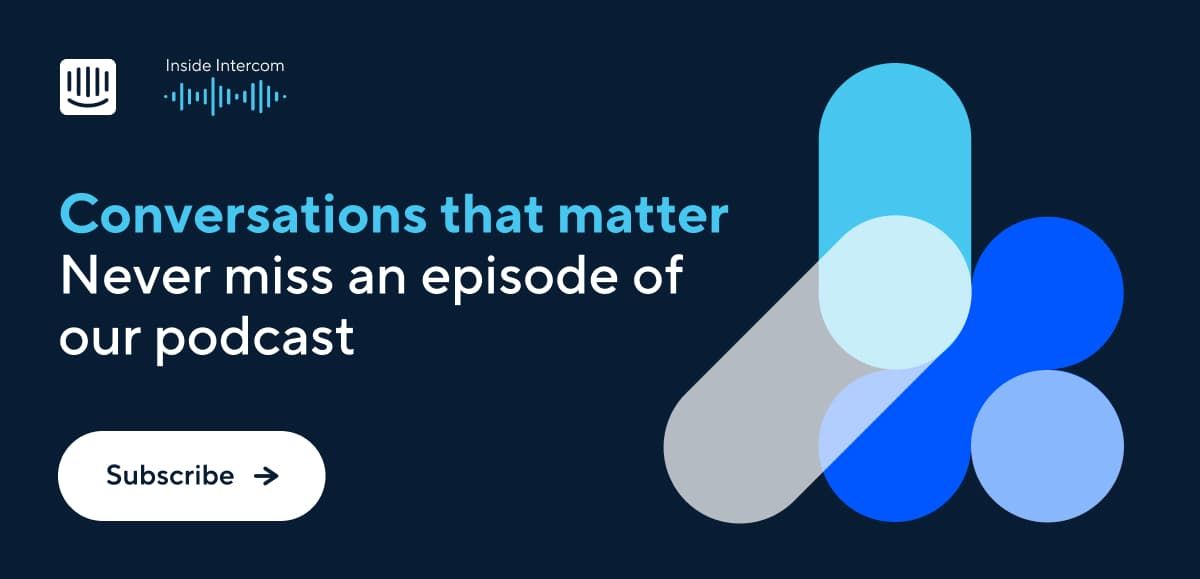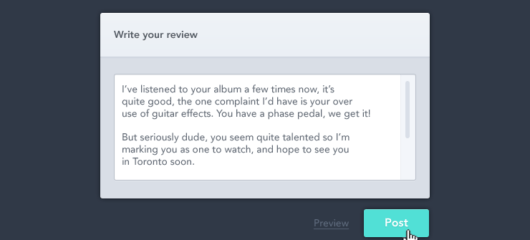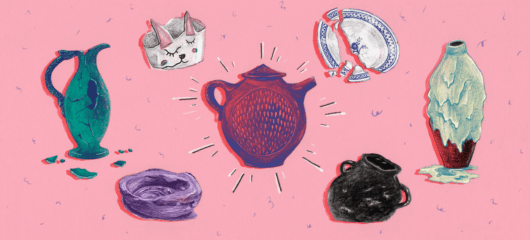
Pride 2022: Being out and bringing people in
To celebrate this year’s Pride, we're sharing the experiences of our peers in the LGBTQI+ community, and their thoughts on allyship, advocacy, and finding spaces where they can truly be themselves.
For the past two years, we carried the spirit of Pride amidst a pandemic that swept through the world. We learned to work remotely and tried (and keep trying) to strike a healthy work-life balance and stay connected with our loved ones. We moved events and workshops online due to lockdowns and restrictions – holding learning sessions that covered topics such as the ABCs of LGBT and trans awareness – recorded the experiences and memories of our own LGBTQI+ community, and learned to better navigate the challenges and social changes that are taking place across the world.
While the pandemic isn’t over, and there will certainly be many challenges going forward, this year, we’re going back out. And so, for Pride 2022, Intercom is celebrating with the theme out in the world and bringing people in. Pride is, first and foremost, a protest, but it’s also a celebration and a display of solidarity. In this special Inside Intercom episode, we’ve interviewed a few of our teammates to hear not only about their lives and experiences, but what it means to be an ally. You’ll hear from:
- Jessica Filizola (she/her), a Billing Operations Specialist based in Dublin
- Shauna O’Brien (she/her), a Customer Support Specialist based in Dublin
- Ryan Parker (he/him), a Senior Support Specialist based in Chicago
- Jennifer Gore (she/her), IT Specialist based in Dublin
- George Castro (he/him), a Senior People Operations Associate based in Chicago
To celebrate Pride, we wanted to share some of those conversations with you.
If you enjoy our discussion, check out more episodes of our podcast. You can follow on iTunes, Spotify, YouTube or grab the RSS feed in your player of choice. What follows is a lightly edited transcript of the episode.
Out in the world
Liam Geraghty: Hello and welcome to Inside Intercom, I’m Liam Geraghty. For Pride 2022, Intercom is celebrating with the theme out in the world and bringing people in. It’s all about sharing the lived experiences of those who are out while equipping allies with the knowledge to support their peers in the LGBTQI+ community. With that in mind, on today’s show, five Intercomrades sat down to share with us their thoughts.
Jessica Filizola: My name is Jessica. I work in the Dublin office, and I work in the billing team. I’m a Billing Ops Specialist. So yeah, I work with the customers, what they paid, what they didn’t pay, and everything. For me, this is really important because I came from a family that wasn’t supportive and accepting of me when I came out in these last long years. So, everybody supporting me and being an ally was extremely important. Without the allies I had throughout my life, I don’t know how I would cope with that. So, it’s really important.
Shauna O’Brien: I’m Shauna, I’m based out of Dublin, and I’m on the customer support team. As a gay woman, allyship is knowing that people have your back. I personally haven’t had to deal with any sort of major backlash, thankfully, but I know there are people out there who do, so it’s nice to know that there are people who have your back, who love you and support you no matter what. They don’t even see that part of me, if that makes sense.
“Just ask questions. I know a lot of people would rather you just respectfully ask them, for example, pronouns and things like that”
Ryan Parker: My name’s Ryan Parker, and I’m a Senior Support Specialist here at Intercom. From day one, I knew my Mom was in my corner. I asked for a Snow White birthday cake for my third birthday, and she got me a Snow White birthday cake for my third birthday. Didn’t say anything of it. I wanted to dress up in a dress and high heels and pretend I was Dorothy from the Wizard of Oz, and she didn’t think anything of it. And, if anyone said anything, she shut them down right away. So my Mom was my first ally, and to this day, she’s still my biggest ally, my best friend.
Jennifer Gore: I’m Jen from the IT team. I started eight weeks ago here, so I’m pretty new. I feel a lot of people in the LGBTQ+ community have similar experiences walking around town, holding hands, or any public displays of affection, and at some point, I think we all have noticed people maybe saying something or giving us that look, and again, it’s when people like allies stand up for you in the moments that matter.
What it means to be an ally
Liam Geraghty: Those moments are so important because being an ally is being willing to act and not just be sympathetic. So, what can you do to be a more effective ally? Our guests had this to say.
Shauna O’Brien: Being curious in the sense of learning rather than being nosy, if that makes sense? For example, if you’re out drinking and you’re in a smoke area and you bump across a wide variety of people, you’re going to meet loads of different people. Just ask questions. I know a lot of people would rather you just respectfully ask them, for example, pronouns and things like that. I know that a lot of my friends would be confused about transgender, for example. So, I’d happily be, “Yeah, I’ll sit down and have a chat with you.” Stuff like that. Especially one of my friends who works a lot with the younger generation, and she wouldn’t be as savvy in terms of knowledge around the LGBTQ. So, she’d often text me, “Listen, I had the situation, not quite sure.” And, I’d be, “Listen, this is A, B…” Do you know what I mean? So, definitely being curious to learn, but also being respectful in that sense. Not kind of coming across that you’re being nosy.
Ryan Parker: I think, a lot of times, it might be difficult for people. They don’t understand. There are still things in the community that I don’t fully understand. There are a lot of things I’m learning every day as we shift and grow and more people come out into the forefront, and you get to see more and more what this community looks like.
“If you have an ally that’s willing to call things out, that’s a big help in all kinds of situations like work and school or when you’re out and about”
Here in America, you go to any graduation, and someone is bound to quote Dr. Seuss. And, whenever they do that, everyone kind of rolls their eyes. So, this might be an eye roll moment for some of the people listening, but I’m going to quote Dr. Seuss here because I think it’s very appropriate. “Be who you are and say what you feel because those who mind don’t matter, and those who matter don’t mind.” And, when I look back at all of the allies I’ve experienced throughout my entire life and the people I have in my life now, I’ve always known they don’t mind. If you can be that person to the people in your life who are different from you, then I think you got it. I think you’re on the right track.
Jessica Filizola: I think every little thing helps. You can be an incredible ally if you have friends that start talking about something and you can stand up and say, “Look, this is not all right. The comment you’re making is not okay.” You can educate other people and make them understand the situation better. This was something I really relied on when everything started for me because my parents were completely against it. If they had someone that could turn around to them and say, “Look, what you’re saying is not okay,” this would probably change their mindset a little. So, if you turn around and say, “I’m an ally,” but you don’t stand up and say something when people are making comments that are not okay, you are definitely not an ally.
Jennifer Gore: My main thing is getting involved a bit more or being more knowledgeable about things. So, even if it’s looking into things, reading up about things that are happening and challenges, because you obviously don’t have the same experiences as people in other communities. So, listening to their stories and voices helps give you a perspective. And again, even going to events and fundraisers and things like that helps as well.
Those are some things that I would myself do, but it comes down to the small things as well, like when you’re in a situation and maybe somebody says something that doesn’t sit right, and you’re uncomfortable about calling that out… If you have an ally that’s willing to call things out, that’s a big help in all kinds of situations like work and school or when you’re out and about. “No, that didn’t sit right with me.” If other people start doing it too, that’s a big help.
“Being an ally is a choice. It is about choosing to visibly and vocally stand up for the rights of others and to call out bias and unacceptable behavior”
George Castro: My name is Castro. I’m a people operations associate here at Intercom, and I’m also an ERG leader for our Latino community at Intercom, as well as an ally to our LGBTQ+ community. I was born and raised in Chicago. I have two dogs, and I love coffee.
To me, allyship means being willing to take risks in order to support someone or a group of people. I see allyship as being receptive to new ideas and learning to understand and appreciate the person or the group you’re trying to learn from. When I was in grade school and I was learning about civil rights and other social movements for equality, I was really thinking to myself, “Had I been old enough then, I would have stood up and done the right thing.” And now I am. And in spite of the great progress that the LGBTQ+ community has made so far, there’s still a lot of progress and a lot of work to be done. I still see inequality. So, I believe it’s a personal responsibility to stand up and advocate and help others who may not have the same voice as others in other communities.
From my experience at Intercom and in my personal life, one of the most powerful waves I’ve seen other allies advocate for is just in their everyday actions. Being an ally is a choice. It is about choosing to visibly and vocally stand up for the rights of others and to call out bias and unacceptable behavior. Using your voice can really affect change. And, as you mentioned previously, some people don’t necessarily know how to be an ally, or they think they’re an ally, but it just goes far beyond expressing passive support. It really is a long-term commitment to advocate for others. I’ve been an ally in and outside work for many years, and it really has been a journey of learning and growth. It has taught me so much, not only about others but about myself, too. And most of all, I’ve been amazed at the impact allyship can have on a personal and a collective level, in the community.
Together every step of the way
Liam Geraghty: In Intercom, we have an employee resource group called InterProud, which organizes workshops, discussions, and events to educate and celebrate our LGBTQI+ community. And, as a member of that community, I can tell you, they do really valuable work that just makes you feel like you can be yourself here. And, I’m not the only one who loves that.
“I’ve been able to succeed and grow going on almost four years here at the company because I have been able to be completely who I am and I’ve felt valued every step of the way”
Jessica Filizola: I mentioned that I was gay in my interview. Straight away, they were really excited and told me, “Oh, we have a group, InterProud, you’re going to enjoy it.” When I started working here, I joined InterProud and saw all the events and it made me really engaged with the company from the start. It was a really good experience. I had the same feeling as you. I was, “Oh, that’s really cool. Everybody’s like me.” And, I enjoy that.
Ryan Parker: This is the first company I’ve worked for where I’ve been able to be truly myself and not feel judged. At a lot of other companies before Intercom, I felt that maybe some of the qualities that come with my gayness and my queerness were detractors, and people didn’t take me seriously because of that. I would feel that I was left out of opportunities for growth. And, Intercom, from day one, has said, “This is what we love about you and so let’s use that.” I’ve been able to succeed and grow going on almost four years here at the company because I have been able to be completely who I am and I’ve felt valued every step of the way.
Liam Geraghty: My thanks to Shauna, Ryan, Jennifer, Castro, and Jessica. That’s it for today. But, from everyone at Intercom, Happy Pride.






